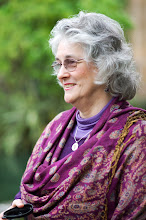 | ||
Pagan Summit, Bloomington, Indiana, 2001
|
Ever since I’ve been on a Pagan path I’ve heard of
BNPs. The acronym was told to me to
indicated Big Name Pagans. Over time,
as more people found their way to one Pagan path or another, or began to create
their own paths more specific to their particular worldviews, the term BNP took
on a negative connotation. I started to
hear it explained as Big-Nosed Pagans.
Most of those referred to as BNPs had published a book or
several and were known for that. Of
course, when I was coming up, there were few books, and those there were tended
to be elementary. They lacked depth,
refinement, and nuance. Today,
thankfully, creative Pagans have explored Paganisms in much greater depth. They’ve done academic and historical research,
as well as incorporating anecdotal evidence for their theories – good ol’ UPGs. Practitioners of reconstructed traditions of
many kinds have explored the traditions they’re reviving, and thereby have advanced
this learning tremendously. As well,
walkers on more personal Pagan paths, including “hard polytheists,” have
contributed to our growing body of resources.
I’ve encountered plenty of disdain in various Pagan social
contexts of what the disdainers called BNPs.
Overall, I think this is unfair.
Yes, there are well-known Pagan authors on the broomstick circuit who
expect a degree of deference, who require that their luggage be carried and
other assistance rendered. However, not
all behave that way. And in some cases,
as with older or frailer authors or those who may be traveling with small
children, such accommodations are justified.
I see many other Pagans who aren’t necessarily authors with
a body of published books, although often they contribute to anthologies, to
published (in the sense of printed matter) discussions and online fora, and who
otherwise contribute to the understanding of our communities among the general
public. They may be known, but not necessarily as authors. After all, leadership takes many forms.
We Pagans also have poets, sculptors, painters, dancers,
musicians, song-writers, ritualists, and other artists who might, by the common
understanding of the term BNP, be deserving of the appellation.[1]
There are also many other Pagans who’ve taken on leadership
roles. Some organize festivals, or they
may take on the big task of creating the meal plans and arranging for cooking, feeding, and cleanup; or do the
accounting a festival requires; or do all the advertising and promotional work;
or book the flights for presenters; or fetch guests from the local airport; or
one of the many other roles necessary to make a festival happen. Some may be leaders while others would more accurately
be considered volunteers. In whatever
capacity they work, they are helping to create Pagan culture.
Another kind of Pagan leader may be someone who’s done
substantial work in the context of interfaith activities, or is a Pagan
scholar.
More recently, I offer as an example one individual, John
Halstead, who solicited involvement from Pagans of all stripes who, with
his facilitation, created a Pagan Community
Statement on the Environment. This
is not a Pagan who has a bunch of books to promote and workshops to lead (that
I know of). Surely this action can be
seen as one of assuming leadership.
For them, and others who’ve taken on leadership roles, I
propose a new term: PPPs, or Publicly
Prominent Pagans. How do you like it?
[1] Check back later for more on Pagan artists,
writers, and musicians as agents of cultural change.
